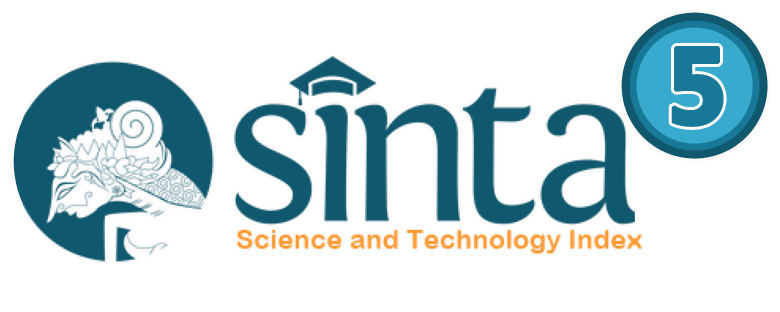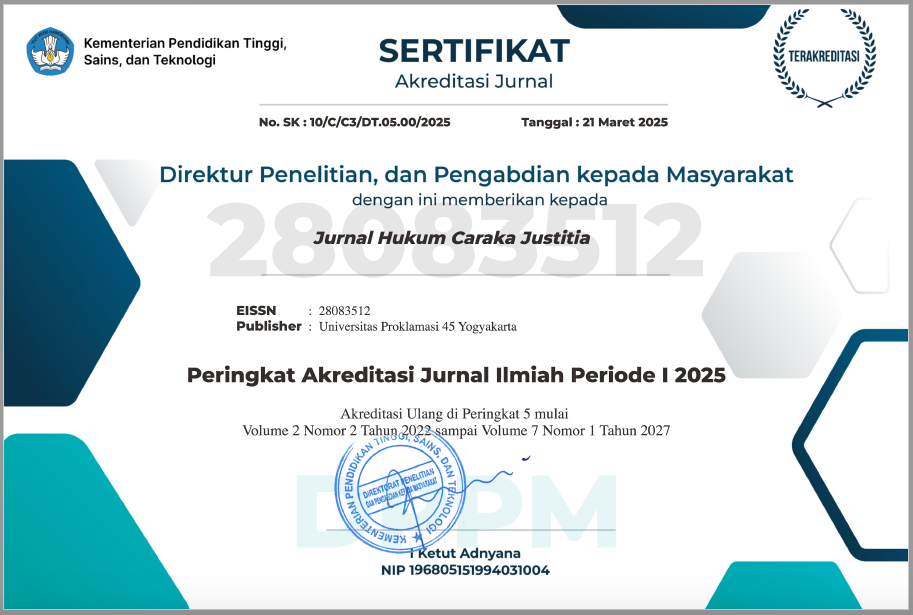Titik Singgung Sengketa Pertanahan di Lingkungan Peradilan Umum, Agama, dan Tata Usaha Negara
DOI:
https://doi.org/10.30588/jhcj.v3i1.1492Keywords:
Land Dispute Resolution, District Court, Religious Court, Administrative Courts.Abstract
The judiciary courts under the Supreme Court have the authority as stated in Article 25 of Law Number 48 of 2009, which are District Courts, Religious Courts, Military Courts, Administrative Courts. However, there is an intersection of land dispute cases in the General, Religious, and State Administrative courts. Disputes over court decisions include the disputing parties’ inacceptance of the court decision. Court decisions unable to be be executed because the ownership status and owners have changed.
The different legal consequences for the dispute object status of the same case will make the case more complicated, the resolution is not fast and the costs are not cheap. So that it is not in accordance with the principle of simple justice, fast and low cost and there are differences in the interpretation. In order to create fair and just law enforcement in Indonesia, namely the existence of the following pillars: Fair and correct law enforcement.
The existence of law enforcers with dignity, professionalism, integrity and the creation of a conducive social environment (a society that is aware of the law). With the case and statutory approach method, an agrarian court was formed to resolve disputes related to land cases, its job is not only to examine formal books but material truth by understanding the principles of land tenure and ownership provided for by the national land law. Improving the chamber system in settlement of land cases or disputes.
References
Artikel Jurnal
Istijab. “Penyelesaian Sengketa Tanah Sesudah Berlakunya UUPA”, Widya Yuridika Jurnal Hukum 1, no. 1 (Juni, 2018): 11-23. http://download.garuda.kemdikbud.go.id/article.php?article=756582&val=12080&title=penyelesaian%20sengketa%20tanah%20sesudah%20berlakunya%20undang-undang %20pokok%20agraria.
Nurdin, Maharani. “Akar Konflik Pertanahan Di Indonesia”, Jurnal Hukum Positum 3, no. 2 (Desember, 2018): 126-141. https://journal.unsika.ac.id/ index.php/positum/article/download/2897/1756.
Sukmawati, Putu Diva. “Hukum Agraria Dalam Penyelesaian Sengketa Tanah Di Indonesia”, Jurnal Ilmu Hukum Sui Generis 2, no. 2 (April, 2022): 89-95. https://ejournal2.undiksha.ac.id/index.php/JIH/article/download/1015/508.
Buku
Ibrahim, Jhony. Teori dan Metodologi Penelitian Hukum Normatif, Cetakan 3. Jakarta: Bayumedia, 2007.
Jhon W, Creswell. Penelitian Kualitatif & Desain Riset. Yogyakarta: Pustaka pelajar, 2015.
Mahkamah Agung RI. Buku II Pedoman Teknis Administrasi dan Teknis Peradilan Tata Usaha Negara. Jakarta: Mahkamah Agung, 2009.
Mahkamah Agung RI. Pedoman Pelaksanaan Tugas dan Admintrasi Pengadilan, Buku II, cetakan ke-4. Jakarta: Mahkamah Agung, 2002.
Saleh, Mohammad. Penerapan Azas Peradilan Sederhana Cepat dan Biaya Ringan pada Eksekusi Putusan Perkara Perdata. Jakarta: Graha Cendikia, 2017.
Sumardjono, Maria S.W. Tanah dalam Perspektif Hak Ekonomi Sosial dan Budaya. Jakarta: Kompas, 2008.
Syarief, Elza. Menuntaskan Sengketa Tanah. Jakarta: Gramedia, 2017.
Disertasi
Harmani, Ratna. “Titik Singggung Kompetensi Peradilan Tata Usaha Negara dan Peradilan Umum dalam Sengketa Tanah serta Dampaknya Terhadap Kepastian Hukum”, Ringkasan Disertasi, Program Doktor Fakultas Hukum Universitas Padjajaran Bandung, 2009.
Artikel
Barbun, Supardy. “Penyelesaian Sengketa dan Konflik Pertanahan”, FGD Urgensi Sertifikasi Hakim Menangani Sengketa Pertanahan, 21 Maret 2023.
Harsono, Boedi. “Penyelesaian Sengketa Pertanahan sesuai ketentuan-Ketentuan dalam UUPA”, Kantor Menteri Negara Agraria/Kepala BPN, 22 Oktober 1996.
Saleh, Mohammad. “Problema Titik Singgung Perkara Perdata di Peradilan Umum dengan Perkara Di Lingkungan Peradilan Lainnya”, Fakultas Hukum Airlangga, 2015.
Sumardjono, Maria S.W. “Implikasi Pertanahan dan Penyelesaian Secara Hukum”, Sigma Conferences, 26 Maret 1996.
Tehupieory, Aarce. “Konsep dan Teori Dasar Pertanahan, Pelatihan Topik Dasar-Dasar Pertanahan dan Hukum Agraria di Lingkungan Komisi Pemberantasan Korupsi”, Komisi Pemberantasan Korupsi, 13-14 September 2021.
Tehupieory, Aarce. “Titik Singgung Sengketa Pertanahan di Lingkungan Peradilan”, Mahkamah Agung RI Badan Litbang Diklat Hukum dan Peradilan, 21 Maret 2023.
Tehupiory, Aarce. “Role Model Pemberantasan Mafia Tanah”, Forum Keadilan, 10 Januari 2022.
Internet
Badan Pertanahan Nasional. “Tipologi Kasus-Kasus Pertanahan Menurut Badan Pertanahan Nasional”. http://www.bpn.go.id/Program/Penanganan-Kasus-Pertanahan (diakses 5 Mei 2023).
Mahkamah Agung RI. http://putusan.mahkamahagung.go.id/pengadilan/mahkamah- agung/direktori/perdata/tanah (diakses 1 Mei 2023).
Mahkamah Agung RI. http://putusan.mahkamahagung.go.id/pengadilan/mahkamah-agung/direktori/tun/ (diakses 5 Mei 2023).
Setiawan, Usep. “Reforma Agraria dalam RPJMN”. https://setkab.go.id/reforma-agraria- (diakses 5 Mei 2023).
Tehupiory, Aarce. “Catatan Akhir Tahun 2022 Tentang Pencegahan dan Pemberantasan Praktek Mafia Tanah”. https://youtu.be/R5FAzHeXVEQ (diakses 1 Mei 2023).
Tehupiory, Aarce. “Role Model Pemberantasan Mafia Tanah”. https://youtu.be/sZdsF4TGj7s (diakses 1 Mei 2023).
Peraturan Perundang-Undangan
Undang-Undang Dasar Republik Indonesia Tahun 1945.
Undang-Undang Nomor 5 Tahun 1960 tentang Peraturan Dasar Pokok-Pokok Agraria.
Undang-Undang Nomor 48 Tahun 2009 tentang Kekuasaan Kehakiman.
Downloads
Published
How to Cite
Issue
Section
License
Copyright (c) 2023 Aarce Tehupeiory

This work is licensed under a Creative Commons Attribution 4.0 International License.
Authors who publish with JHCJ agree to the following terms:
Authors retain copyright and grant the JHCJ right of first publication with the work simultaneously licensed under a Creative Commons Attribution 4.0 International License that allows others to share (copy and redistribute the material in any medium or format) and adapt (remix, transform, and build upon the material) the work for any purpose, even commercially with an acknowledgment of the work's authorship and initial publication in JHCJ.
Authors are able to enter into separate, additional contractual arrangements for the non-exclusive distribution of the journal's published version of the work (e.g., post it to an institutional repository or publish it in a book), with an acknowledgment of its initial publication in JHCJ. Authors are permitted and encouraged to post their work online (e.g., in institutional repositories or on their website) prior to and during the submission process, as it can lead to productive exchanges, as well as earlier and greater citation of published work (See The Effect of Open Access).














